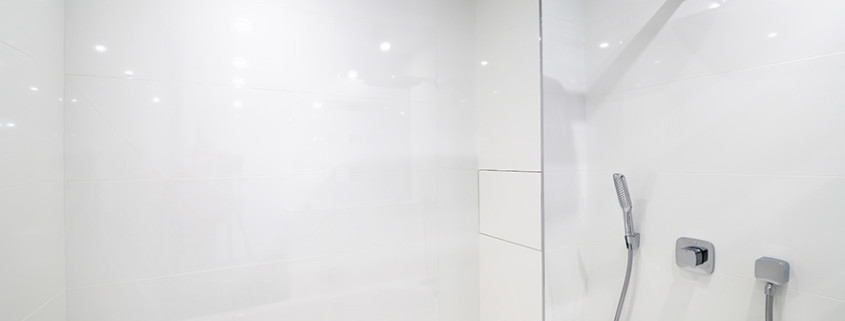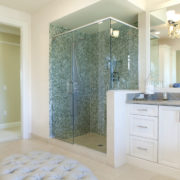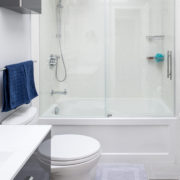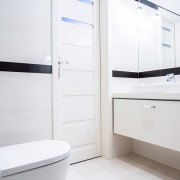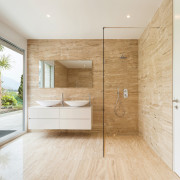Tub to Shower Conversion Cost
There are many reasons to convert your old tub and shower combination into a walk-in shower. Whether your redesign is to turn an outdated bathroom into a spa-like retreat or to improve the functionality and value of a master bathroom, you will want to know the scope and cost of the work involved before jumping into this project. Just be sure you are not turning the only tub in your home into a walk-in shower. Homes that have at least one bathtub will always have more value over homes without, especially for families with children.
DIY Tub to Shower Conversion Steps
By doing some or all of the work yourself, you can save yourself quite a bundle on labor costs. Before you begin, you will want to measure everything. The tub width is typically 60 inches, which is great for a walk-in shower. However, the depth falls short of desirable; aim for at least 32-34 inches between the finished tiled wall and the glass door.
The minimum shower size is 30×30 inches, so keep this in mind if you plan to include a bench in your walk in shower. You will also want to take note of the toilet’s location—15-18 inches of clearance from the center of the toilet to the glass of the shower door is best. Additionally, you will want to be sure that the glass can clear the toilet if the door swings open; you can avoid this issue be installing sliding shower doors instead.
Once your plans are finalized, shut off the water and tear out everything (the walls, tub, etc.). You will want to quite literally take it back to the studs. Next, you will need to reposition the drain and plumbing to accommodate the new shower panel being installed. After the plumbing is taken care of, you can install the new flooring.
Next you will install the cement backing board from floor to ceiling. The primary benefit of cement board is that it does not grow mold or rot in wet environments as drywall or wood does. That makes this material ideal to use in a shower. After this step, you can install your bathtub to shower conversion kit. This should include flooring, drain, curb, and waterproofing membrane.
Now comes the fun part: tiling! Tiling may not actually be the most enjoyable job in the world, but it does breathe new life into your bathroom design. Tile and grout from floor to ceiling taking care to leave holes for your shower fixtures and water drain.
Lastly, you can install your shower panel and doors. Once your grout is dry, your shower is ready to use! A complete shower remodel of this sort can be very challenging. If you do not have plumbing and construction experience, you can always call in the professionals.
Tub to Shower Conversion Cost Breakdown
Plans: You may decide to consult a designer. These individuals will charge hourly. If you can handle the measurements on your own and already know how you would like to transform your bathroom, you can avoid this cost entirely.
Permits: Projects that involve plumbing almost always require permits that pass inspection. This cost will vary depending on local building codes. Some cities charge a flat fee while others use a sliding scale depending on a variety of factors including the scope of the project as well as the approximate worth.
Demo: The Bureau of Labor Statistics indicated that the median pay for construction workers in 2014 was $17.19/hour. You can avoid this cost by doing the demolition yourself.
Plumbing: Using the same statistic source as above, the average cost of hiring a plumber is $26.26/hour; however, some plumbers may give you an estimate for the entire project up front.
Installation: Prefab shower enclosures start as low as $500, but costs will go up with material quality. For example, a fiberglass installation will cost significantly less than a marble one. Tiles are another expense that varies dependent upon materials. Ceramic tile is often well under a dollar per square foot while custom tile can be several dollars per square foot.
As with the other installation costs, the fixtures you choose will impact your final budget. Simple fixtures such as a single shower head are as low as $30; multiple shower heads with numerous controls can be hundreds of dollars.
According to Home Advisor, the average cost for a shower installation is $1140-$5142, with an average reported cost of $3130. Doing some of the work on your own can bring down this final cost dramatically.
Check out this video to see an example of this kind of remodel:

